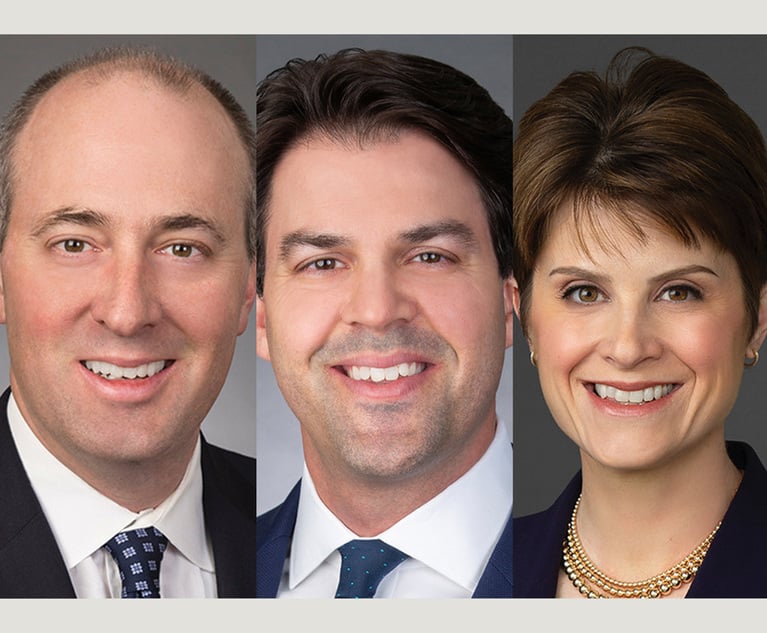Daily Dicta: Sullivan & Cromwell's Giuffra Seals the Deal on Appeal
The $2 billion putative securities class action against UBS is believed to be the last Enron-related case to make its way through the courts.
May 29, 2019 at 01:39 PM
5 minute read
 Robert Giuffra, partner at Sullivan & Cromwell
Robert Giuffra, partner at Sullivan & Cromwell
One of the awkward things about Litigator of the Week is that every so often, we pick winners and praise them to the skies, only to see them lose on appeal a year or two down the line.
Whoops.
On the other hand, we never picked Michael Avenatti, so I feel OK about our credibility overall.
But the best outcome of all is when we pick a winner at the trial court level who goes on to seal the deal on appeal. That's what Sullivan & Cromwell's Robert Giuffra Jr. did for UBS last week in what is believed to be the last Enron-related case to wend its way through the courts.
“Wend” might actually be too speedy a term to describe the pace. It took 15 years after the putative securities class action was filed in 2002 for U.S. District Judge Melinda Harmon in Houston to grant UBS' motion to dismiss for failure to state a claim in 2017.
“This case started right after my eldest daughter was born, and she's heading to college in a year,” said Giuffra, who argued the appeal for UBS. Sullivan & Cromwell's Brendan Cullen and William Wagener worked with him on the litigation, as did Rodney Acker of Norton Rose Fulbright.
 Then again, from the perspective of UBS, which was facing a $2 billion demand, there was little advantage to hurrying. Because while UBS waited as the complaint was amended and amended again, consolidated into an MDL and then removed, amended a third time and then stayed pending SCOTUS review of a similar case, other banks and financial institutions involved with Enron settled investor lawsuits for more than $7.2 billion.
Then again, from the perspective of UBS, which was facing a $2 billion demand, there was little advantage to hurrying. Because while UBS waited as the complaint was amended and amended again, consolidated into an MDL and then removed, amended a third time and then stayed pending SCOTUS review of a similar case, other banks and financial institutions involved with Enron settled investor lawsuits for more than $7.2 billion.
But not UBS, which was sued by individual retail-brokerage customers who purchased Enron securities and Enron employees who acquired employee stock options.
On appeal, the Fifth Circuit upheld the district court's dismissal, shutting down a pair of novel legal theories by plaintiffs' lawyers from the Spencer Law Firm. David Augustus, who argued the appeal for the plaintiffs, did not respond to a request for comment.
It's one of those decisions that's as notable for what it didn't do as for what it did.
Had the Fifth Circuit gone the other way, Giuffra said, it “would have imposed unprecedented duties on financial services firms and created the risk of massive liability over the grant of employee stock options.”
Half of the case involved individual retail-brokerage customers of PaineWebber, which was acquired by UBS in July 2000. The customers bought Enron stock between November 5, 2000 and December 2, 2001, when Enron filed for bankruptcy.
The plaintiffs claimed UBS had knowledge of Enron's “financial chicanery” because of its “long standing banking history with Enron.” They argued that UBS as a single, integrated business venture had a duty to disclose that information to its retail-brokerage customers.
Senior Judge Patrick Higginbotham writing for the unanimous panel that also included judges Jerry Smith and James Graves, Jr., said no.
First, the panel found that the plaintiffs didn't establish that the defendants shared joint venture liability.
It wasn't enough to point to a post- PaineWebber acquisition press release, where UBS described itself as an “integrated” bank and plus other “vague corporate platitudes about integration as a firm.” The panel held that the “plaintiffs' use of the grouping 'UBS' does not cure the fact of those entities' separate legal statuses.”
What about the bank's duty to disclose material nonpublic information about Enron to its retail investment customers?
“PaineWebber was the entity that communicated with the retail brokerage customer plaintiffs but plaintiffs fail to allege that PaineWebber had knowledge of Enron's financial misrepresentations,” the panel found. “The defendant with the duty was not the defendant with the knowledge. Simply labeling the offending entity 'UBS' does not rescue plaintiffs from this fatal flaw.”
The plaintiffs also sued on behalf of Enron employees who got stock options between October 19, 1998 and November 19, 2001. PaineWebber allegedly underwrote the options, acting “the exclusive broker and stock option plan administrator for Enron.”
The plaintiffs said that made PaineWebber liable for “materially false statements contained in the Enron prospectuses and registration statements,” in violation of Sections 11 and 12 of the Securities Act of 1933.
But as the panel noted, Sections 11 and 12 expressly limit liability to “purchasers or sellers of securities.” Here, we're talking about stock options.
“[T]he grant of options to employees here was not a sale,” Higginbotham wrote for the panel. “The employees did not bargain for the options and they were granted for no cash consideration.”
“The fact that plaintiffs would eventually make an affirmative investment decision—whether to exercise the option or let it expire—at some point in the future is of no consequence,” he continued. “Plaintiffs' claims are based explicitly on the grant of the option, not the exercise of that option.”
Which means there was no sale—and this case is a non-starter.
This content has been archived. It is available through our partners, LexisNexis® and Bloomberg Law.
To view this content, please continue to their sites.
Not a Lexis Subscriber?
Subscribe Now
Not a Bloomberg Law Subscriber?
Subscribe Now
NOT FOR REPRINT
© 2025 ALM Global, LLC, All Rights Reserved. Request academic re-use from www.copyright.com. All other uses, submit a request to [email protected]. For more information visit Asset & Logo Licensing.
You Might Like
View All
Litigators of the Week: A $604.9M Trade Secrets Verdict With a Big Assist From a Juror Question

Litigators of the Week: A Reset in the Fight Over Nearly $2B in Bonds Issued by Venezuela's National Oil Company

How Kirkland & Ellis Litigators Became a National Brand in Oil and Gas

Dorsey & Whitney Hits Back Against Complaint Claiming Firm Dragged Its Feet on Malpractice Suit Against Fellow Big Firm
Trending Stories
- 1Delaware Supreme Court Names Civil Litigator to Serve as New Chief Disciplinary Counsel
- 2Inside Track: Why Relentless Self-Promoters Need Not Apply for GC Posts
- 3Fresh lawsuit hits Oregon city at the heart of Supreme Court ruling on homeless encampments
- 4Ex-Kline & Specter Associate Drops Lawsuit Against the Firm
- 5Am Law 100 Lateral Partner Hiring Rose in 2024: Report
Who Got The Work
J. Brugh Lower of Gibbons has entered an appearance for industrial equipment supplier Devco Corporation in a pending trademark infringement lawsuit. The suit, accusing the defendant of selling knock-off Graco products, was filed Dec. 18 in New Jersey District Court by Rivkin Radler on behalf of Graco Inc. and Graco Minnesota. The case, assigned to U.S. District Judge Zahid N. Quraishi, is 3:24-cv-11294, Graco Inc. et al v. Devco Corporation.
Who Got The Work
Rebecca Maller-Stein and Kent A. Yalowitz of Arnold & Porter Kaye Scholer have entered their appearances for Hanaco Venture Capital and its executives, Lior Prosor and David Frankel, in a pending securities lawsuit. The action, filed on Dec. 24 in New York Southern District Court by Zell, Aron & Co. on behalf of Goldeneye Advisors, accuses the defendants of negligently and fraudulently managing the plaintiff's $1 million investment. The case, assigned to U.S. District Judge Vernon S. Broderick, is 1:24-cv-09918, Goldeneye Advisors, LLC v. Hanaco Venture Capital, Ltd. et al.
Who Got The Work
Attorneys from A&O Shearman has stepped in as defense counsel for Toronto-Dominion Bank and other defendants in a pending securities class action. The suit, filed Dec. 11 in New York Southern District Court by Bleichmar Fonti & Auld, accuses the defendants of concealing the bank's 'pervasive' deficiencies in regards to its compliance with the Bank Secrecy Act and the quality of its anti-money laundering controls. The case, assigned to U.S. District Judge Arun Subramanian, is 1:24-cv-09445, Gonzalez v. The Toronto-Dominion Bank et al.
Who Got The Work
Crown Castle International, a Pennsylvania company providing shared communications infrastructure, has turned to Luke D. Wolf of Gordon Rees Scully Mansukhani to fend off a pending breach-of-contract lawsuit. The court action, filed Nov. 25 in Michigan Eastern District Court by Hooper Hathaway PC on behalf of The Town Residences LLC, accuses Crown Castle of failing to transfer approximately $30,000 in utility payments from T-Mobile in breach of a roof-top lease and assignment agreement. The case, assigned to U.S. District Judge Susan K. Declercq, is 2:24-cv-13131, The Town Residences LLC v. T-Mobile US, Inc. et al.
Who Got The Work
Wilfred P. Coronato and Daniel M. Schwartz of McCarter & English have stepped in as defense counsel to Electrolux Home Products Inc. in a pending product liability lawsuit. The court action, filed Nov. 26 in New York Eastern District Court by Poulos Lopiccolo PC and Nagel Rice LLP on behalf of David Stern, alleges that the defendant's refrigerators’ drawers and shelving repeatedly break and fall apart within months after purchase. The case, assigned to U.S. District Judge Joan M. Azrack, is 2:24-cv-08204, Stern v. Electrolux Home Products, Inc.
Featured Firms
Law Offices of Gary Martin Hays & Associates, P.C.
(470) 294-1674
Law Offices of Mark E. Salomone
(857) 444-6468
Smith & Hassler
(713) 739-1250






